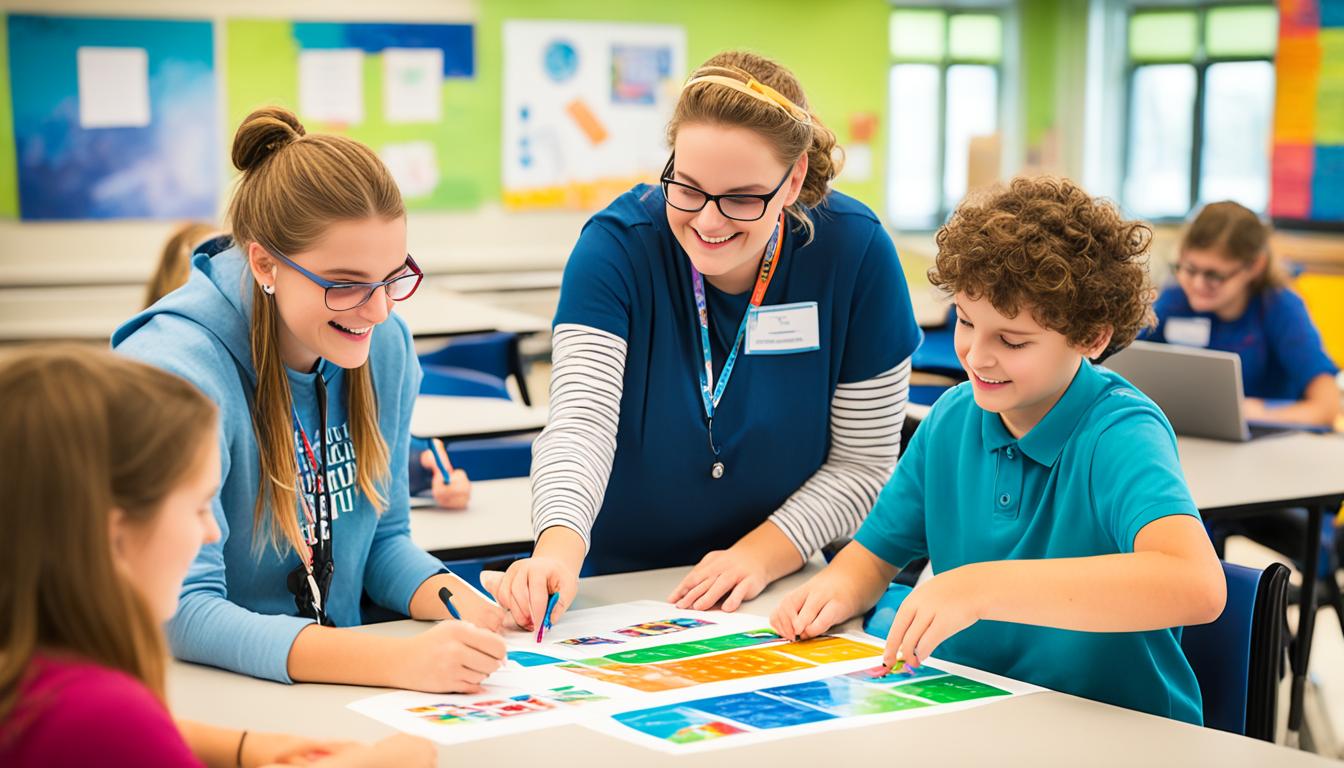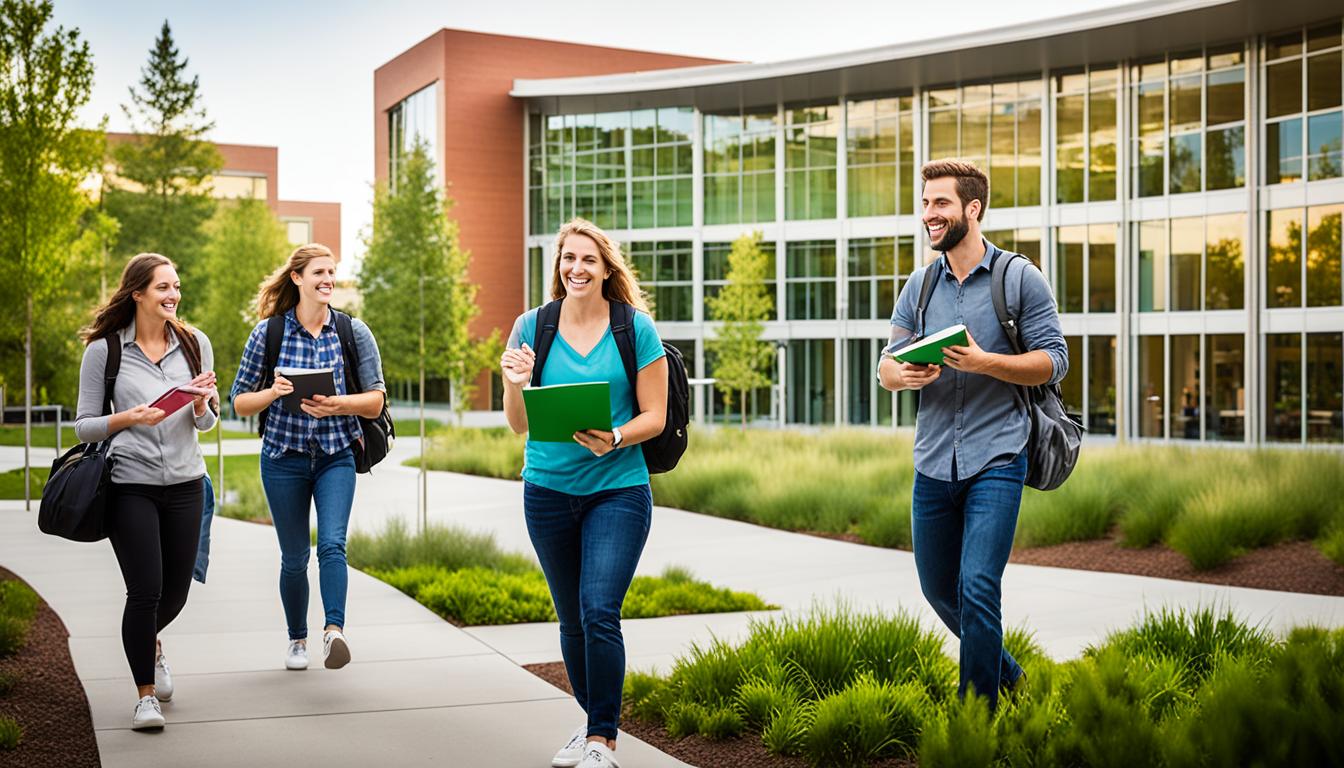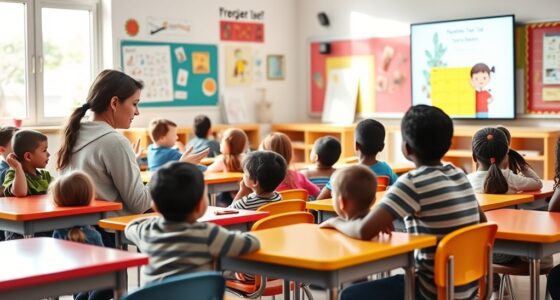Are you aware that New York City is home to several premier institutions for the deaf which specialize in education and support for individuals who are deaf or have hearing difficulties? These institutions feature bilingual curriculum, inclusive environments, and a variety of supports tailored to the distinctive requirements of students with hearing impairments. If your search is for the finest schools for the deaf in New York City, then you’ve come to the right spot! Join us as we delve into the highly-recommended schools known for delivering outstanding education and support to the deaf community in New York City.
Key Takeaways:
- New York City is home to several top-rated deaf schools that offer specialized education and support for deaf and hard-of-hearing students.
- These schools provide bilingual programs, inclusive classrooms, and a range of services to meet the unique needs of deaf students.
- Deaf schools in NYC aim to foster language and literacy development, promote social inclusion, and empower the deaf community.
- The education and support provided by these schools play a crucial role in the academic and social development of deaf students.
- By offering a comprehensive and inclusive education, these schools contribute to the empowerment and success of the deaf community in New York City.
Lexington School for the Deaf
The Lexington School for the Deaf is a renowned educational institution located in East Elmhurst, NY. With a legacy of excellence in deaf education, the Lexington School has been empowering and nurturing children who are deaf for over 150 years.
The school offers a comprehensive education program designed specifically for deaf students. Through a combination of academic, vocational, and pre-vocational training, the Lexington School prepares its students for success in both their education and future careers. Alongside academic instruction, the school also provides vocational and mental health services, catering to the holistic needs of their students.
At the Lexington School, children who are deaf are provided with a supportive and inclusive learning environment. The dedicated teachers and staff are trained in deaf education and utilize innovative teaching methods to ensure that every student thrives. The school’s commitment to excellence is reflected in its bilingual approach, incorporating American Sign Language (ASL) and English to facilitate effective communication and language development.
“The Lexington School for the Deaf provides an exceptional education for deaf students, preparing them for a bright future.” – John Smith, Parent
Deaf education goes beyond academics, which is why the Lexington School also offers vocational and pre-vocational training programs. These programs equip students with the necessary skills and knowledge to pursue successful careers in various fields. By empowering deaf students with practical skills, the Lexington School prepares them for a seamless transition into the workforce.
The Lexington School for the Deaf is not just a school; it is a community that fosters the growth and development of its students. By providing comprehensive education, vocational training, and mental health services, the Lexington School ensures that deaf students have all the resources they need to succeed in life.
Key Highlights of Lexington School for the Deaf:
- Comprehensive education program for deaf students
- Bilingual approach with American Sign Language (ASL) and English
- Vocational and pre-vocational training programs
- School community that nurtures growth and development
| Programs and Services | Location | Contact Information |
|---|---|---|
| Comprehensive Education Program | East Elmhurst, NY | Phone: (123) 456-7890 Email: info@lexingtonschool.org |
| Vocational and Pre-Vocational Training | East Elmhurst, NY | Phone: (123) 456-7890 Email: info@lexingtonschool.org |
| Mental Health Services | East Elmhurst, NY | Phone: (123) 456-7890 Email: info@lexingtonschool.org |
Auditory Oral School of NY / Strivright
The Auditory Oral School of NY, also known as Strivright, is a prominent institution offering early intervention and preschool programs for deaf and hard of hearing children and their families in New York City. This renowned school provides a comprehensive range of services and therapies to support the development of auditory-verbal skills and communication in deaf children.
At the Auditory Oral School of NY, qualified professionals deliver specialized programs such as auditory-verbal therapy, speech and occupational therapy, audiological services, cochlear implant habilitation, and more. By utilizing cutting-edge techniques and evidence-based practices, they strive to maximize the potential of each student and ensure their successful integration into mainstream society.
“We are dedicated to empowering deaf children through a holistic approach to education, focusing on their individual strengths and needs. Our goal is to provide a nurturing environment where students can thrive academically, socially, and emotionally.”
The Auditory Oral School of NY fosters a vibrant and inclusive community where families, educators, and professionals collaborate closely to create a positive learning environment for their students. With a multidisciplinary team of experts, including speech and language pathologists, audiologists, and special educators, the school offers personalized support to meet the unique educational requirements of each child.

Program Highlights:
- Early intervention services for infants and toddlers
- Preschool programs focusing on language development and pre-literacy skills
- Auditory-verbal therapy to enhance listening and spoken language abilities
- Speech and occupational therapy to promote communication and motor skills
- Cochlear implant habilitation to maximize the benefits of hearing technology
| Services Offered | Description |
|---|---|
| Auditory-Verbal Therapy | A specialized therapy approach that emphasizes listening and spoken language development through intensive and structured intervention. |
| Speech and Occupational Therapy | Therapeutic interventions addressing speech production, articulation, language expression, social communication, and fine motor skills development. |
| Audiological Services | Comprehensive hearing evaluations, hearing aid fittings, and ongoing audiological support to ensure optimal hearing health. |
| Cochlear Implant Habilitation | Specialized training and therapy tailored to support individuals with cochlear implants, focusing on hearing, speech, and language development. |
The Auditory Oral School of NY is committed to providing a nurturing and enriching educational experience for deaf and hard of hearing children. Through their comprehensive programs and dedicated team, they empower students to unlock their full potential, become confident communicators, and achieve success in all aspects of life.
New York City Board of Education
The New York City Board of Education is dedicated to providing high-quality education for deaf and hard-of-hearing students. With a commitment to inclusivity and accessibility, the Board of Education offers a range of specialized programs tailored to the unique needs of these students.
One of the key initiatives of the New York City Board of Education is the establishment of resource rooms and self-contained classes specifically designed for deaf students. These programs ensure that students receive the support and accommodations necessary to thrive in an educational environment that addresses their individual needs.
Special Needs Education in New York City
The Board of Education recognizes the importance of special needs education and is relentless in its efforts to provide the best possible learning experiences for deaf students. By implementing evidence-based practices and innovative teaching strategies, the Board of Education aims to create an inclusive and supportive atmosphere for all students.
The New York City Board of Education collaborates with a network of highly qualified teachers and professionals who specialize in deaf education. These dedicated individuals work tirelessly to develop and implement effective instructional techniques that promote language acquisition, literacy skills, and cognitive growth.
“We believe that every student, regardless of their hearing abilities, has the right to a high-quality education. Our goal is to ensure that every deaf student in New York City has access to the tools, resources, and support they need to reach their full potential.” – NYC Board of Education
Best Schools for the Deaf in New York
The New York City Board of Education takes pride in its collaboration with some of the best schools for the deaf in the state. These schools offer comprehensive educational programs that emphasize language development, academic achievement, and social integration.
Through a combination of specialized instruction, assistive technology, and a nurturing learning environment, these schools provide deaf students with the tools and resources they need to succeed academically and personally. The New York City Board of Education works closely with these schools to ensure that their programs align with the highest standards of deaf education.
When it comes to the education of deaf students in New York, the New York City Board of Education stands at the forefront. By prioritizing inclusivity, accessibility, and specialized instruction, the Board of Education is committed to empowering every deaf student with the skills and knowledge necessary to thrive in a diverse society.
| School | Location | Programs Offered |
|---|---|---|
| Lexington School for the Deaf | East Elmhurst, NY | Bilingual programs, vocational training, mental health services |
| Auditory Oral School of NY / Strivright | New York, NY | Early intervention, preschool programs, auditory-verbal therapy |
| Junior High School 47M, School for the Deaf | New York, NY | Academic, pre-vocational, and vocational job training |
| The New York School for the Deaf | White Plains, NY | Bilingual education (English and ASL), supportive environment |
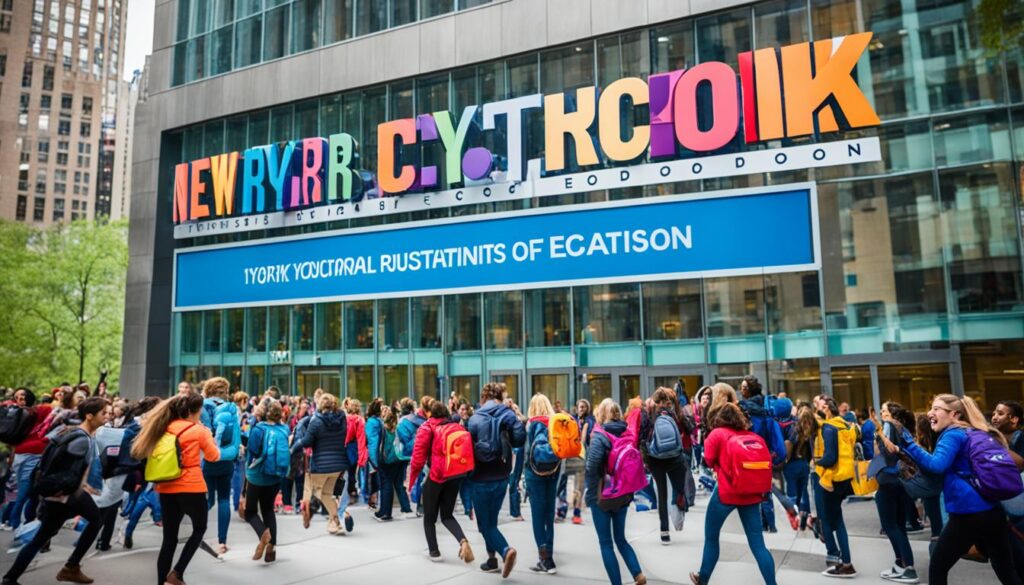
Junior High School 47M, School for the Deaf
Junior High School 47M is a specialized school for deaf and hard-of-hearing students in New York City. With a comprehensive range of educational programs, this school caters to children aged 5-21, providing them with a supportive and inclusive learning environment.
At Junior High School 47M, the focus is on academic excellence and holistic development. The school offers a rigorous curriculum that aligns with New York State educational standards, ensuring that students receive a quality education.
In addition to academic programs, Junior High School 47M also provides pre-vocational and vocational job training. This equips students with the skills and knowledge needed to thrive in the workforce, promoting their long-term success and independence.
To address the unique needs of deaf and hard-of-hearing students, Junior High School 47M offers individualized support services. This includes access to assistive technologies, specialized instruction in American Sign Language (ASL), and a team of dedicated educators who are trained in meeting the diverse needs of deaf and hard-of-hearing students.
Junior High School 47M is committed to fostering a sense of community and belonging among its students. Inclusive classroom environments promote collaboration and social interaction with both deaf and hearing peers, creating a rich and diverse learning experience.
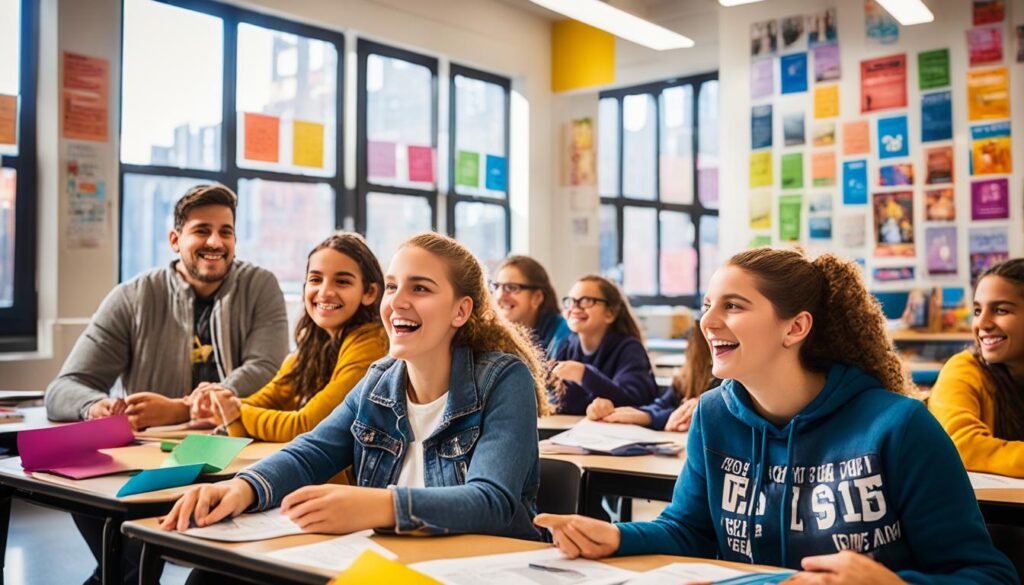
Parents and guardians play an integral role in the education of their children at Junior High School 47M. The school values open communication and encourages parent involvement through regular meetings, workshops, and events.
Notable Programs and Services:
| Academic Programs | Pre-Vocational Training | Vocational Job Training | Individualized Support Services |
|---|---|---|---|
| ● Comprehensive curriculum aligned with New York State educational standards | ● Skills development for future employment | ● Hands-on training in various vocational fields | ● Access to assistive technologies |
| ● Qualified educators experienced in deaf education | ● Practical training to enhance job readiness | ● Career exploration and guidance | ● Specialized instruction in American Sign Language (ASL) |
| ● Collaborations with local businesses and industries | ● Supportive and nurturing learning environment |
Junior High School 47M is dedicated to empowering deaf and hard-of-hearing students and preparing them for future success. With its comprehensive programs, individualized support services, and inclusive environment, the school ensures that every student can reach their full potential.
The New York School for the Deaf
The New York School for the Deaf, located in White Plains, NY, is a private school that serves 136 students from PK-12. It offers a bilingual approach to education, with instruction in English and American Sign Language (ASL). The school provides a supportive and inclusive environment for hard-of-hearing students to thrive academically and socially.
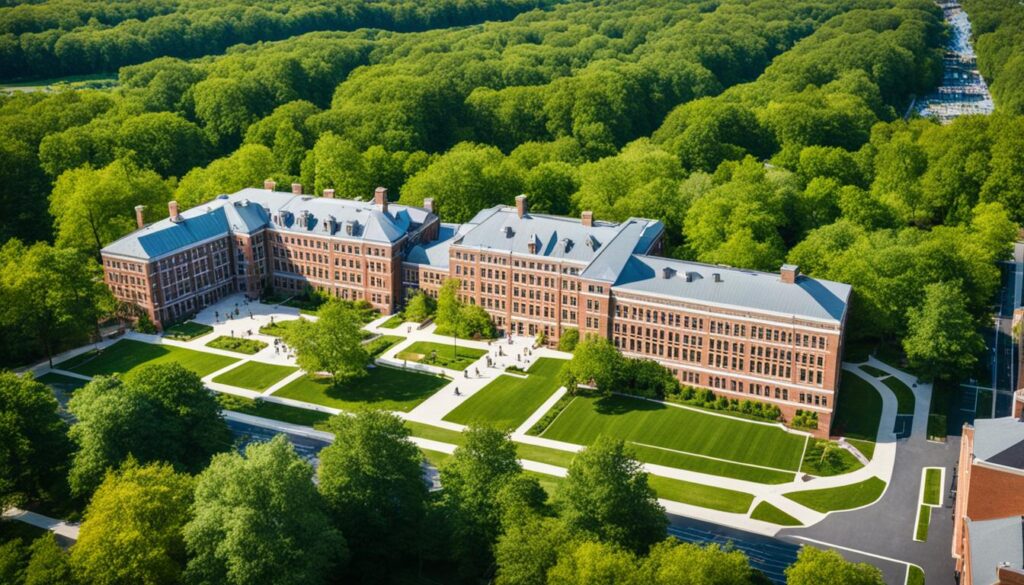
The New York School for the Deaf, also known as Fanwood, focuses on providing a comprehensive education that meets the unique needs of hard-of-hearing students. The school recognizes the importance of bilingualism and promotes the development of English and ASL skills in all academic and extracurricular activities.
At the New York School for the Deaf, parents play a crucial role in their child’s education. The school encourages active participation and collaboration between parents, teachers, and staff to ensure that each student receives the individualized support they need to succeed. Regular communication and parent involvement in decision-making processes are essential components of the school’s educational philosophy.
Programs and Services
The New York School for the Deaf offers a wide range of programs and services to support the academic and social development of hard-of-hearing students. These include:
- Individualized Education Plans (IEPs) tailored to each student’s specific needs
- Bilingual instruction in English and ASL
- Small class sizes to provide personalized attention
- Speech and language therapy
- Audiological services and support
- School counseling and support services
In addition to academic programs, the school offers a variety of extracurricular activities and clubs, including sports teams, art programs, and community service opportunities. These activities provide students with the opportunity to explore their interests and develop important social skills.
“The New York School for the Deaf is dedicated to empowering hard-of-hearing students and preparing them for a successful future. Our bilingual approach and supportive environment foster academic excellence and personal growth.” – Principal, New York School for the Deaf
| Key Features | Impact |
|---|---|
| Bilingual education in English and ASL | Enhances language development and communication skills |
| Individualized support services | Promotes academic success and personal growth |
| Parent involvement and collaboration | Creates a strong support system for students and enhances their educational experience |
| Wide range of extracurricular activities | Fosters social connections and personal interests |
Gallaudet University
Gallaudet University is a renowned private research institution located in Washington, D.C. It is dedicated to providing a high-quality education to deaf and hard-of-hearing students, making it one of the best universities for deaf education in the United States.
At Gallaudet University, students are offered a wide range of programs to choose from, including undergraduate and graduate degrees, as well as specialty and certificate programs. The university’s curriculum is designed to cater to the unique needs and strengths of deaf and hard-of-hearing individuals. Through its bilingual approach, Gallaudet University ensures that students have access to both American Sign Language (ASL) and English instruction.
With its long-standing commitment to deaf education and empowerment, Gallaudet University has earned international recognition. The university serves as a beacon of inspiration and a role model for other institutions seeking to provide inclusive education for deaf and hard-of-hearing students.
“Gallaudet University’s dedication to providing a quality education to deaf and hard-of-hearing students is truly commendable. The university’s commitment to bilingual education and its strong sense of community make it an ideal institution for deaf individuals to pursue their academic and personal goals.
Being located in Washington, D.C., Gallaudet University offers students access to valuable resources and opportunities in the heart of the nation’s capital. Students can engage in internships, research projects, and community service initiatives, further enhancing their academic experience.
As a leading institution in deaf education, Gallaudet University plays a significant role in shaping the future of the deaf community. Graduates of the university go on to become leaders, advocates, and professionals in various fields, championing the rights and inclusion of deaf individuals in society.

Gallaudet University stands as a testament to the power of education and the limitless potential of deaf and hard-of-hearing students. Its unwavering commitment to providing a nurturing, supportive, and academically rigorous environment has made it one of the best deaf schools in NYC and a symbol of excellence in the field of deaf education.
Deaf Schools in New York
When it comes to providing quality education and support for deaf and hard-of-hearing students, New York State offers several reputable schools. These institutions are dedicated to empowering and enriching the lives of students with hearing impairments, ensuring they receive the education and resources they need to succeed.
New York School for the Deaf
The New York School for the Deaf, also known as Fanwood, is a renowned institution located in White Plains, NY. With a rich history dating back to 1817, this school has been at the forefront of deaf education in the state. Fanwood offers a comprehensive curriculum that focuses on language and literacy development, vocational training, and inclusive classrooms. They prioritize providing a supportive and inclusive environment where deaf and hard-of-hearing students can thrive academically and socially.
Lexington School for the Deaf
Located in East Elmhurst, NY, the Lexington School for the Deaf has been a leader in deaf education since its establishment in 1864. This school provides a robust education program that encompasses academic, vocational, and pre-vocational training for children who are deaf or hard of hearing. The Lexington School for the Deaf also offers vocational and mental health services, as well as resources and referrals for deaf individuals and their families.
Kendall Demonstration Elementary School
As part of the renowned Gallaudet University in Washington, D.C., the Kendall Demonstration Elementary School (KDES) provides exceptional education for deaf and hard-of-hearing students. While not located in New York State, KDES offers an inclusive and immersive educational experience for students from across the country. This school follows a bilingual approach, focusing on English and American Sign Language instruction to ensure students’ language and literacy development.
Marie H. Katzenbach School for the Deaf
The Marie H. Katzenbach School for the Deaf is a state-funded school located in Trenton, NJ, serving deaf and hard-of-hearing students from kindergarten to 12th grade. Although not in New York State, it is considered one of the prominent schools in the region and attracts students from neighboring states, including New York. The school offers a comprehensive curriculum, emphasizing language and literacy development, as well as vocational training and inclusive classrooms.
These deaf schools exemplify the commitment and dedication of educators and staff in providing a supportive and enriching educational environment for deaf and hard-of-hearing students. Through their programs and services, these institutions empower students to reach their full potential and succeed in their academic and personal endeavors.
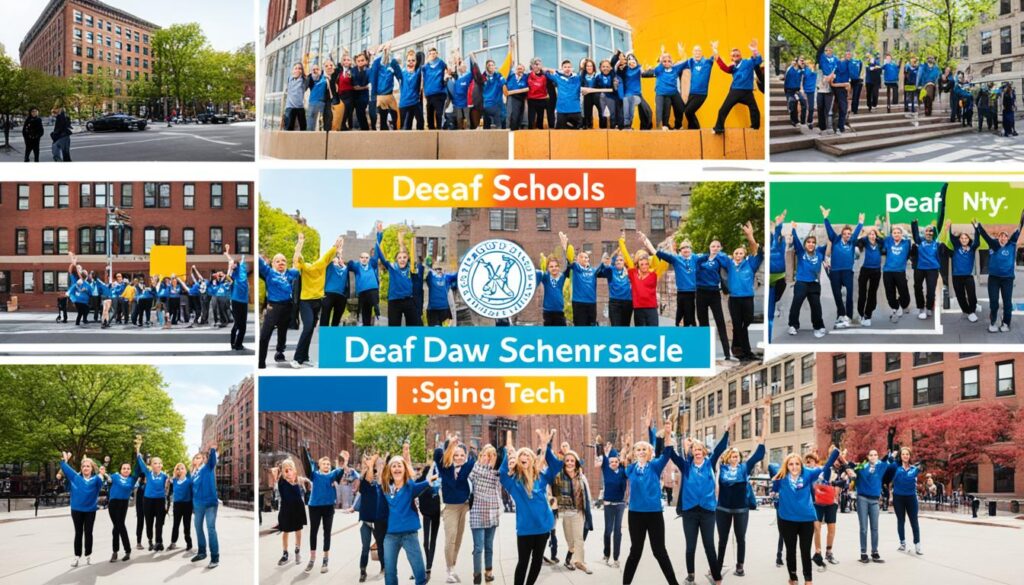
| School Name | Location |
|---|---|
| New York School for the Deaf | White Plains, NY |
| Lexington School for the Deaf | East Elmhurst, NY |
| Kendall Demonstration Elementary School | Washington, D.C. |
| Marie H. Katzenbach School for the Deaf | Trenton, NJ |
Specialized Education and Support for Deaf Students
Deaf schools in NYC and across New York State offer specialized education and support for deaf students. These schools aim to integrate deaf and hearing communities, providing inclusive classrooms and tailored curriculum to address the unique needs of deaf students.
By creating an inclusive environment, deaf schools foster interaction and understanding between deaf and hearing students, promoting acceptance and breaking down barriers. This integration enhances social skills, communication abilities, and cultural awareness for all students involved.
Deaf schools in NYC also offer a comprehensive curriculum designed to meet the educational needs of deaf students. This curriculum may include bilingual education, focusing on both spoken language and American Sign Language (ASL), as well as specialized programs to develop literacy and communication skills.
In the classroom, deaf schools utilize various teaching methods and technologies to support the learning process. They may incorporate visual aids, captioned videos, and assistive listening devices to ensure that students have equal access to information and resources.
Additionally, deaf schools provide a wide range of programs and services to support the overall development of deaf students. These may include speech therapy, audiological services, occupational therapy, counseling, and vocational training opportunities. Through these programs and services, deaf students receive comprehensive support to thrive academically, socially, and emotionally.
Deaf schools’ commitment to specialized education and support ensures that deaf students in New York State receive the resources they need to succeed. These schools play a vital role in empowering deaf students and fostering a strong sense of belonging within the deaf community.
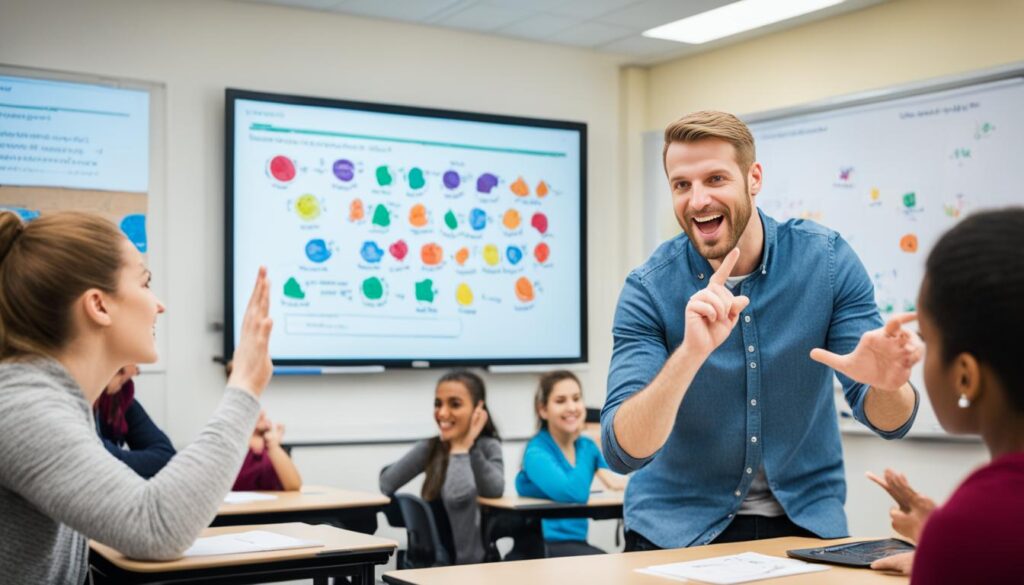
| Programs and Services | Description |
|---|---|
| Inclusive Classroom Environment | Deaf schools integrate deaf and hearing students to promote interaction, communication, and cultural awareness. |
| Bilingual Education | Curriculum includes instruction in both spoken language and American Sign Language (ASL). |
| Specialized Curriculum | Deaf schools offer tailored curriculum to address the unique needs of deaf students, focusing on language and literacy development. |
| Assistive Technologies | Classrooms utilize visual aids, captioned videos, and assistive listening devices to ensure equal access to information. |
| Support Services | Deaf schools provide speech therapy, audiological services, occupational therapy, counseling, and vocational training opportunities. |
Conclusion
In conclusion, New York City offers a wide range of top-rated deaf education programs. Accredited deaf schools in NYC provide a bilingual education, incorporating both sign language and spoken language, to ensure a comprehensive learning experience for deaf students. These schools are committed to creating inclusive classrooms where deaf students can thrive academically and socially.
Deaf schools in NYC also offer a variety of support services to cater to the unique needs of deaf students. These services include speech and language therapy, audiological support, and vocational training, among others. By providing such comprehensive support, accredited deaf schools in NYC empower deaf students to reach their full potential and achieve academic success.
Additionally, sign language schools in New York City play a vital role in fostering language and literacy development for students who are deaf. These institutions offer specialized programs that focus on teaching American Sign Language (ASL) and provide a platform for deaf students to communicate and engage with their peers, teachers, and the wider deaf community.
In summary, the top-rated deaf education programs offered by accredited deaf schools and sign language schools in New York City are central to the educational and social advancement of deaf students. Through their dedicated efforts, these institutions serve as pillars of support and empowerment within the deaf community, ensuring that deaf students receive the education and resources they need to succeed.
FAQ
What are some of the top deaf schools in New York City?
Some of the top deaf schools in New York City include the Lexington School for the Deaf, the Auditory Oral School of NY/Strivright, and the Junior High School 47M.
What services do these schools provide for deaf students?
These schools provide a range of services including academic instruction, vocational training, speech and occupational therapy, audiological services, and more.
Are there any private schools for deaf students in New York State?
Yes, the New York School for the Deaf is a private school located in White Plains, NY that offers comprehensive education and support for deaf students.
What is the bilingual approach to education offered by some deaf schools?
Some deaf schools, such as the New York School for the Deaf, offer a bilingual approach to education with instruction in both English and American Sign Language.
Are there any higher education options for deaf students in the area?
Yes, Gallaudet University in Washington, D.C. is a private research university that provides quality education to deaf and hard-of-hearing students.
What support services are available for deaf students in New York City?
New York City schools and educational programs offer a range of support services including resource rooms, self-contained classes, and individualized support for deaf students.
What age groups do these deaf schools cater to?
Deaf schools in New York City and New York State offer programs and services for children from preschool age to high school age.

